#hyperion titan
Explore tagged Tumblr posts
Text

#my memes#percy jackson fandom#percy jackson memes#percy jackon and the olympians#the last olympian#the lightening thief#ethan nakamura#atlas pjo#kampe pjo#oceanus pjo#hyperion pjo#alabaster c torrington#alabaster torrington#dr. thorn#kelli pjo#minotaur pjo#rhea pjo#iapetus#krios pjo#chris rodriguez#silena beauregard#kronos pjo#typhon pjo#luke castellan#the titan army#titan army#prometheus pjo#prometheus is my favorite titan!#there were three categories in the Titan Army#Titans
54 notes
·
View notes
Photo


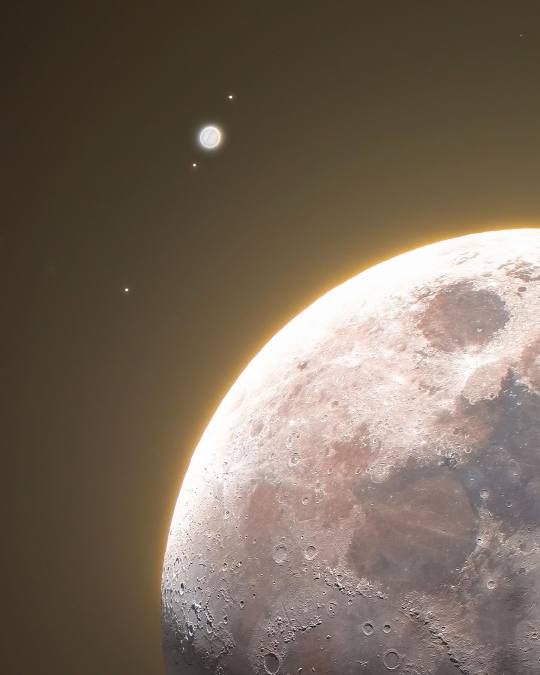

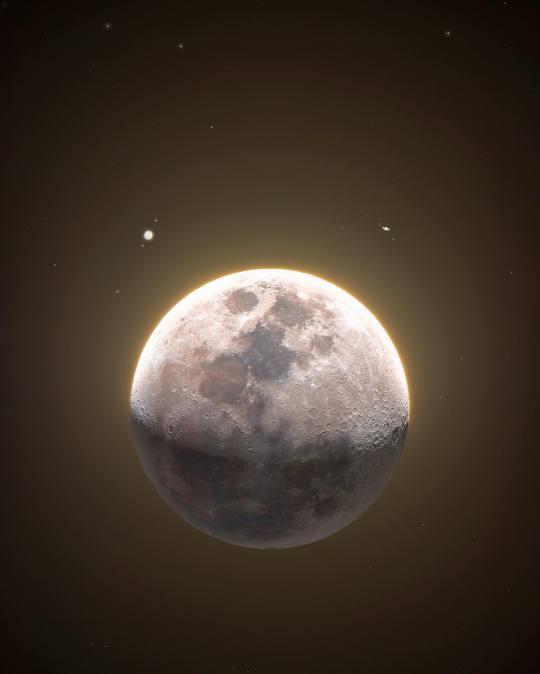
“ Moon and the two giants “ // Rami Ammoun
#Richmond#Virginia#United States#nightsky#astrophotography#Moon#conjunction#Jupiter#Saturn#Ganymede#Io#Europa#Callisto#Lapetus#Rhea#Dione#Tethys#Titan#Mimas#Hyperion#space#aesthetics#explore#follow#discover
451 notes
·
View notes
Text

Immortals (2011)
#2011#film#movie#mythology#Immortals#Tarsem Singh#Henry Cavill#Theseus#Freida Pinto#Phaedra#Mickey Rourke#King Hyperion#Luke Evans#Zeus#Isabel Lucas#Athena#Titans#Greek mythology
15 notes
·
View notes
Text
Kinda interesting that besides the former King Cronus and Queen Rhea, Theia and Hyperion are assumingly the only couple who were able to have a lineage mighty enough for their children to be the personification of the Sun, Moon, and Dawn respectively. Not to mention being able to KEEP that role despite no obvious alliance with Zeus during the Titanomachy. (Helios and Selene get semi-replaced by Apollo and Artemis but still maintain their positions enough that Helios has a role in Hephaestus, Demeter, and Heracles' stories) (also Zeus never seeks out a replacement for Eos as the goddess of Dawn which makes me think that they are amiable with each other)
Compare that to Iapetus' four sons getting fucked in four different directions, Coeus and Phoebe's only real relevance being Leto and their grandchildren by Zeus and being grandparents to Hecate, Oceanus and Tethys producing and losing Metis while their other numerous children play minor to adequate roles, and Crius' sons merely being "husbands" to more well-known deities (Eos, Styx, Asteria). (Astraios being the biggest research disappointment because you'd think the husband of the Goddess of Dawn would be the God of Dusk and have an active role during sunset but no, he's just a God of the stars sadly).
(Of course, there are also Themis' and Mnemosyne's daughters by Zeus, who are very important, but like Leto's case it helps that their children's father is the King of The Gods and Zeus x Titanesses is almost 99% guarantee they get good roles) (then there's Prometheus Bound where Prometheus' mother is Themis only which is cool but I mostly consider Clymene as his mother)
#this post is just a long way for me to justify my hc that theia and rhea are twin sisters destined to have strong children by their husband#gotta love the assonances#greek mythology#rhea#theia#hyperion#cronus#kronos#titans#helios#selene#eos#zeus#hera#poseidon#demeter#hades#hestia#iapetus#clymene#prometheus#epimetheus#atlas#phoebe#coeus#leto#asteria#oceanus#tethys#metis
34 notes
·
View notes
Text

Titan Couple: Hyperion & Theia.
#mythology#greek mythology#myart#anti lore olympus#anti lo#my artwork#mythology art#greek mythology art#my art#Titans#titan#titaness#hyperion#hyperion art#theia#theia art
70 notes
·
View notes
Text

Dammit why couldn’t they make Hera the daughter of Oceanus and Tethys 🫤
#missed opportunity of the century#greek mythology#ancient greek mythology#greek pantheon#greek goddess#hera#hera goddess#hera deity#hera greek mythology#hyperion#oceanus#tethys#titans#Titanomachy#hades game#hades ii#hades 2
23 notes
·
View notes
Text

Happy New Year to all my fellow Scorbus Followers!
Anthony and Sam, seen here atop a sightseeing bus in NYC, giving all of us Scorbus supporters the gay content we are all hungry for.
#hpcc#harry potter and the cursed child#scorbus#scorpius malfoy#scorpius hyperion malfoy#albus severus potter#albus potter#cursed child#ccsquad#hp next gen#anthony boyle#sam clemmett#titanic#the cursed child#hpatcc#gay
47 notes
·
View notes
Text
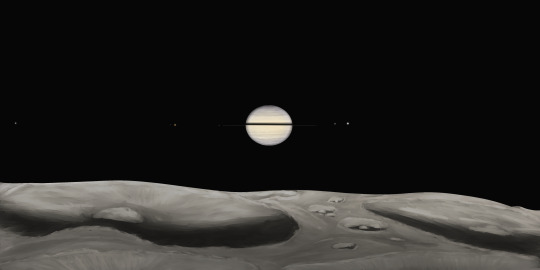
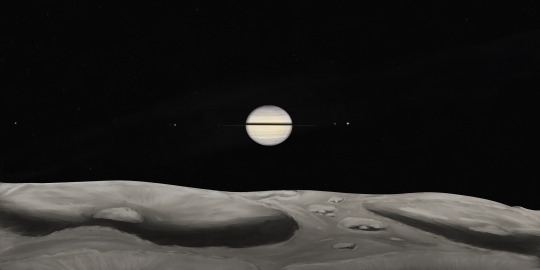
Heaven Surrounds You
Just a quick little piece, showcasing a family portrait of Saturn and her major moons as seen from Hyperion!
Painting head on is very odd; I'm so not used to it! Hopefully the next piece will be better <3
edit: realizing now i forgot dione noooo
#digital art#artists on tumblr#tolbachik art#my art#space art#space#space exploration#digital painting#my posts#moon#moons#titan#iapetus#enceladus#rhea#tethys#dione#mimas#cassini#saturn#saturn's rings#planetary rings#andromeda#nasa#esa#space probe#hyperion#milky way
31 notes
·
View notes
Text

Part of my original art series “Interstellar Olympus”, a reimagining of Greek mythology combined with elements of space.
Purchase wall art, metal cards, and other accessories featuring the series at my Online Store.
#saresai#saresai art#artists on tumblr#space#stars#interstellar olympus series#greek mythology#original art#greek myth#greek titans#Hyperion#titans
14 notes
·
View notes
Text
The myth of Apollo (5)
And here is the last part of Françoise Graziani’s article « Apollo, the mythical sun » (begun here).

IV/ The mystical Sun
The interpretation of the Sun as a symbol of royalty was already present during the Renaissance but was truly amplified by the baroque era. This iconological interpretation was first punctually associated with the panegyric (Ronsard in his “Elegies” wrote “Henry, the Sun that inspired me”), then to the emblematic, as the royal crown was depicted as a crown of sun-rays. While Tyard saw a positive symbol within the idea of the Sun “Prince and rector of the sky”, the baroque poet Drelincourt, in 1677, compared it to a “superb King, who shines in his Court, Crowned with rays” – but only to better accuse the celestial body of being a simulacra of God, a “weak painting”. Within the same idea, Du Bartas substituted the false pagan god to the real God: “The world is a cloud through which shines, not the bow-shooting son of the beautiful Latone, this divine Phoebus, but…”. It is very revealing that Drelincourt presents a critical and desacralizing interpretation of the sun, where it loses its mythical name and function… while writing within the court of Louis XIV, right as the king ideologically concretizes the literary allegories by depicting himself within Versailles (the “house of the Sun”) as Apollo, as the sun on earth. Drelincourt concludes his sonnet “About the Sun”, by insisting that the Sun is just the “portrait of the Primal Cause”: “your brightness is but a Shadow, and you are not the Sun anymore”. The mythical Sun is a false sun, but it is replaced in the metaphorical heaven by the real mystical Sun, the Christ, that the Renaissance paintings sometimes depicted under the traits of Apollo. As a reflection of the true God, as the interpret and the vehicle of God’s light, the Christ was a solar character, whose death was thought as bringing a “night” to the Western world (it was how the poets metaphorize the eclipse that occurred during the Crucifixion). This identification, very common within the mystical baroque poetry, was sometimes pushed to the point of including (in a very unusual way) some episodes of Apollo’s legends within the Christian allegory (such as Hyacinthus or Clythia).

V/ The Sun of intelligence
The mystical sun is, in a paradox that determined all poetic interpretations, linked to the decline of the mythical sun. And yet, the mystical sun is born from a very old topos, the one of the Deus Pictor: if God is a painter, and the Universe his painting, than the Sun (and the poets claim it since the Hellenistic times) is his brush. In the baroque era, the solar myth, heavily used in a metaphorical (not quite allegorical) way, leads this motif towards the realm of abstractions. Every time it appears, it is linked to two elements: on one side, the Sun as a divine principle and an instrument of creation which becomes the double of the poet (a poet that now dares associate himself with not just Orpheus, but Apollo). On the other side, the diurnal travel of the solar eye becomes the metaphor of the process of writing. Numerous baroque texts play on the similarity between the words “rayons” (the rays) and “crayon” (the pencil), to show the Creator in his picturesque and scriptural functions. In a similar way, it is traditional to punctuate long poems by various sunsets and sunrises, described in such a way that they establish an analogy between the rhythm of the days, and the rhythm of the poem itself.
It is for example the case within G. B. Marino’s “Adone”, where, at the end of the poem, the Muse answers Apollo’s call, and comes to “end the thread of this long canvas”, and the end of the last day is described in textual terms: “The sky is of paper, the darkness of ink, the ray a feather / Which with the sun erases the ending day to write / to the West, in letters of gold, the end of the long travel.” Within “Adone”, Apollo is present under different shapes. He is found, in a metaphorical way, in the character of the hero, Adonis, which ultimately is just a gaze that crosses the various spectacles of the universe (celestial world, terrestrial world, cultural world) and is often compared, due to the “shine of his youth”, to Apollo. As the sun is the eye that brightens the world, that reveals the world and that allows it to be, the first creating gaze over the poem is done by the poet itself ; but there is another sight, the image of the human eye that reads and interprets the great Book of Nature. Adonis, within Marino’s poem, plays this role of reader, the double of the creature to which the secrets of the creation are hidden. He is, too, a “false sun”, and this is why Marino show him as a passive hero who, throughout the poem, does not understand what he sees: it is a reverse image of the philosophical sun of the Renaissance. He symbolizes the human soul, in the idea that the human soul only perceives the appearances, and mistakes itself for the sun because it was created in tis image. Marino’s Adonis is a “lonely eye” to which the gods (Venus and Hermes) reveal secrets, but the only world that receives the light of his gaze is the one of the book, of which the real writer is Apollo, “he who brightens the wise minds”. He who shines upon the minds embodies the last avatar of the god of Poetry: the divine Intellect, he who makes the minds shining and insightful, he who gifts human with both invention and divination. The solar sign valorizes the human Intellect, and more so over the individual intelligence. The god doesn’t “inspire” anymore, but he does more by “shining” upon the artistic works.
Apollo is more and more disguised as time passes by, to the point of losing his name – he is substituted so much he is even refused the qualificative of a god. He keeps however, as a mythical sign, a great coherence. The abstract uses of the Sun as metaphors for the divine eye contain very clear remains of its mythical nature. The connotations tied to the solar figure are simply the transpositions, on a metaphorical plane, of the elements tied to the god. The frequency of his use throughout the 16th and 17th centuries proves its almost ritualistic value, even though literature splits itself from the myth. As such, it seems that, as soon as the poetry does not bear the myth of the inspiration anymire, the figure of its titular god is slowly abandoned. Even though the invocation of the Muses persists, as a convention or as a periodical element, all the way to the 19th century. The names of “Apollo”, “Muses” and “Lyre” are enough to designate, by metonymy, and outside of all myths, the very concept of poetry.

VI/ Hyperion
With Romanticism, Apollo becomes the Archer again. The divine inspiration of the poet is not an illumination or a revelation anymore, but a shock, a stupefying possession. The poet, as Hölderlin writes, is “struck by Apollo” and, confronted by the presence of the god, he can’t be understood by other humans anymore. The poetic vocation is assimilated to a curse, and to a suffering. Within Hölderlin’s work, Apollo is fused with both Jupiter, he who strikes with the blinding lightning, he who “shakes and vivifies”, and with Dionysos, to condense itself ultimately in the figure of the Christ. He also especially identified with the one who was, according to Hesiod, his grand-father, the titan Hyperion. Just like Hyperion, of which he bears the name in the allegorical novel of Hölderlin “Hyperion”, the poet is a fallen and exiled titan, whose rebellion (pre-apollonian actions) are doomed to failure, but who keeps the vague memory of his solar origin and of his mission, while still being, like the sun, doomed to loneliness. A loneliness which, in this context, bears both a positive aspect, as the solitude which brings exaltation, and a negative aspect, the solitude which makes the poet a cursed man or a mad man. Apollo and Dionysos become one within the Romantic conception of madness as a sign of both divine election and mystical drunkenness. The fundamental ambiguity of Apollo is found back within the duality of the poetry, perceived as both a grace and an eviction. This duality was felt by the Romantics on an individual plane, and not on a conceptual plane like in the Renaissance.
An exceptional occurrence of the figure of Apollo within literature must be studied, quite close to Hölderlin’s own interpretation. Apollo appears as the subject and the hero of a 19th century literary work in only one piece, an unfinished poem by Keats which was also called Hyperion (1819). This brief epic of a Miltonian style depicts the fall of the Titans, banished by the New Gods, and the rise to divinity of the young Apollo, initiated by Mnemosyne. Within Keats’ writing, just like within Hölderlin’s work, Apollo is treated as the symbol of a “new beauty”, and as the tutelar god, not to say the embodiment, of the New Poetry. For both men, the accent is put on the “divine future” of Apollo: for Keats, Apollo only becomes a god when, thanks to Mnemosyne (who is in mythology the mother of the Muses), he understands his divinity, and this accession to Knowledge is a painful process. Apollo, before striking the poets, suffers himself from an “agony as burning as death is cold”. And he screams painfully when he was his epiphany. Within Hölderlin’s, the name Hyperion symbolized, by an antonomasia, the splitting of the hero, a hero turned to the Ancient Gods, that feels himself as their interpret, and yet is destined to inaugurate the renewal of the Teenager Sun through a New Poetic Religion. The poet which is speaking here is not yet born, and Hyperion represents the mythical prehistory of he who will only become a god, a pure lonely spirit, the “Hermit of Greece”, free of all heroic temptations, only after Romanticism. In a similar way, Keats brutally interrupts his poem right as Poetry is born.
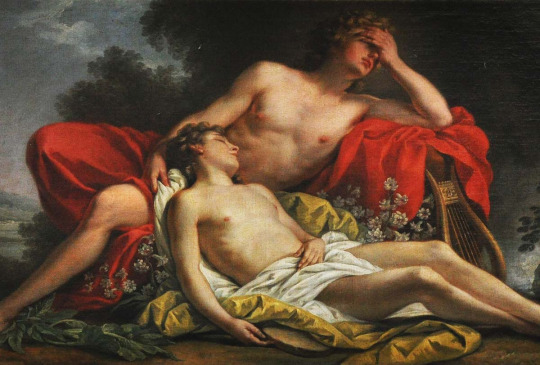
#the myth of apollo#apollo#hyperion#greek mythology#poetry#greek gods#symbolism#sun#titans#keats#hölderlin#christianization of greek myths#greek myths#poetic symbols#literary myths
21 notes
·
View notes
Text
Hyperion vs Titan


#Let's go Titan!!#Hyperion is really pretty tho#astropolls#astronomy#astrophotography#outer space#space#nasa#nasa photos#science#space exploration#space photography#Best moon 2024#saturn's moons#Moons#Titan#Hyperion
11 notes
·
View notes
Text
Au "Deal with the Time" Titans
Oceanus
Oceanus is the first son of Uranus and Gaia. And he doesn't care about anyone or anything. He just exists, gurgling peacefully. There is nothing more to say about him.
The only brother he had any contact with was Chronos. But even the Oceanus doesn't care about him. He would have been sad if he had known about the fate of Chronos, but the Oceanus was not even interested in that. Oceanus does not know the other siblings, although his youngest brother is married to one of his daughters. That's how bad it is.
The eldest and the first not only of the sons, but also of the children of Uranus in general.
Chronos
At the beginning of the story, Chronos perfectly fits the definition of «Lawful Evil». He is pragmatic, determined and determined for revenge. Chronos will always choose what guarantees his success and achievement of the goal, and will not look back at the damage caused by him. Will Titan choose the path of least destruction? If there is such an opportunity, yes, but this is not his priority. First of all, guarantees.
Chronos's motivation is very simple: he considers himself a legitimate ruler who was unreasonably overthrown and dismembered, and he wants revenge for this. For him, the Chthonic gods are nothing more than collateral damage, because the war in any case could not but affect them due to the fact that Hades became the king of the Underworld. In addition, Zagreus, the son of Hades, is also the adopted son of Nyx. She is the main threat to Chronos in the World of the Dead. He couldn't put himself at risk of a confrontation with the night goddess, which is older even than he is, the Time, so Nyx was eliminated first.
Titan perceives his pause spell as mercy, since none of those who fell into it feels anything, time is literally stopped for them. Therefore, Hades is in chains in Tartarus. This is his punishment. The rest are innocent to Chronos, so he shows them mercy. At least from his point of view.
Important note: Chronos in AU is the second son of Uranus. Yes, according to mythology, he is the youngest, but the Supergiant have already made the same Hestia, Demeter and Hera the daughters of Hyperion and Theia, and not Chronos and Rhea, so I think I can change the order a little for the sake of the plot and drama.
Relationships:
Chronos actually takes care of his brothers. He really considers them his own and is ready to do a lot for them. However, unfortunately, this does not make their relationship easier.
Chronos and Hyperion: Due to certain circumstances of their childhood, Chronos is completely unable to express his caring for Hyperion so he prefers to take care covertly or, rather, implicitly for Hyperion himself. This is often expressed by the fact that he covers for his brother when he should have given him a good lesson.
Chronos and Coeus with Crius: Chronos treats the twins like wildcats. When they come, he takes care of them and, if they are in trouble, he saves them. But, in general, they are free to do whatever they want. Chronos will not interfere with their chaos.
Chronos and Iapetus: An older brother for a younger one. They have a close and very trusting relationship, and Chronos will turn the world upside down for Iapetus. Do not touch his younger brother with even a finger, otherwise you will lose your hand.
Hyperion
Meet the local big bully, who for some reason was given a flamethrower. If Chronos is a «Lawful Evil», then Hyperion is a «chaotic evil» in its purest form and, often, in its worst manifestations.
In this story, he is a tragic asshole. Titans is almost completely lost and blurred, many of their domains and spheres of activity were invented by us, based on sources. That's why Hyperion is the titan of daylight. He can warm you up, or he can burn you. Hyperion chose the second. He is the main fighter of Chronos, who, once on the battlefield, will cause the most damage and destruction and will laugh at it. At some point you will wish him dead, and I will fully understand you.
Hyperion is the third son of Uranus.
Relationships:
Hyperion and Chronos: Their dynamics are very complex, and its explanations lie in childhood, which I will tell you about separately. Now it's a strange mixture of contempt, brotherly love and hatred. Hyperion curses his older brother, but he also loves him, even if he does not admit it. Would he betray Chronos? Yes. He would have done it if he didn't hate the Olympians more. But, basically, the relationship of these two should be called bitter and unhappy on both sides. Hyperion is Chronos' left hand and his commander–in-chief
Hyperion and Coeus with Crius: Neutral. They acknowledge each other's existence, but prefer not to get involved. Hyperion tried to fight them once, and Koy and Crius stabbed him many times for it. That was the end of it.
Hyperion and Iapetus: Hyperion hates Iapetus. There's nothing more to say. If he had his way, he would have burned his younger brother and dumped the ashes into Chaos. Alas, Chronos does not allow it.
Coeus with Crius
Coeus and Crius are chaotic neutral. A little wild titans. They're twins. They move the same way, they don't need speech for each other, they look like mirror images. They use only gestures to communicate with others, they hardly speak. Wild and chaotic in a good way. No one knows what's on their minds, and, for the world's well-being, it's better not to know any more.Coeus is the titan of the axis of heaven , and Crius - of the stars. The fourth and fifth sons of Uranus.
Relationships:
Coeus with Crius and Chronos: They love their older brother, believe in him, and fight on his side. But at the same time, if they had just been released after the first Titanomachy, they would have settled into a peaceful life away from everyone. They would not avenge Chronos.
Coeus with Crius and Hyperion: They don't like him. We'd rather it didn't exist. But he is there. They resigned themselves.
Coeus with Crius and Iapetus: Friends. They love and take care of him. They protect Iapet, and they prefer that he be fine.
Iapetus
Iapetus is chaotic neutral with an emphasis on «chaotic». The Trickster.
He seems cheerful and kind at first, but he always has a double bottom and often hidden motives. The most devious and deceitful of sons. Adheres to the rules of morality, but for him they are more of a recommendation character. The local snake and the chief strategist. He is treacherous and very secretive. He is not physically strong and always prefers words to blades. He doesn't get into fights, but he arranges them for others. He can play a long game. An interesting fact: Iapetus is the great–grandfather of Hermes, and Hermes completely took after him in character. They even move and speak alike.
Iapetus is the titan of life. His children are not in vain so closely connected with the human race: he is the creator of monkeys and the first people; now there are no more of them, they all died during the Titanomachy. He values life, but he will take it away if he has to.
The sixth son of Uranus.
Relationship:
Iapetus and Chronos: Iapetus will die and kill for his older brother. He has an unshakable loyalty to him that cannot be shaken. Iapetus is Chronos' right–hand man, his strategist and advisor.
Iapetus and Hyperion: There is mutual hatred between them. If Hyperion had been trampled by a mob, Iapetus would have been the one who set her off. He will not lead it just so that Chronos does not scold.
Iapetus and the twins: They love him, he loves them. The calm family relations of the brothers, even if not the closest.
(English is not my native language, sorry for the mistakes)






#chronos hades#chronos#hades supergiant#hades 2#hades game#hades chronos#Iapetus#Coeus#Crius#Hyperion#Oceanus#Titans#AU Deal with the Time
15 notes
·
View notes
Text
Does anybody know where Theoi gets the theory that the titans (save for Okeanos and Kronos) held Ouranos down and were associated with the cardinal points?
The titans attacking Ouranos as a collective body, save for Okeanos, is attested (Apollod. 1.1.4 and Orphic Fr. 135 Kern), though how they participate is to my knowledge never expanded upon. Though Theoi cites nebulous "near-eastern cosmogonies" as parallels, I've yet to find these (despite the popularity of the motif throughout many other mythical traditions).
Koios being named Polus by Hyginus (Fabulae. Preface) is certainly very interesting. Πόλος could sometimes refer to the Pole Star, and Leto is sometimes described as hailing from Hyperborea (Ael. On Animals. 4.4) or being brought to Delos by the North Wind (Hyginus Fabulae 53 and 140). Though a connection to the North is not impossible, it's nevertheless conjecture. Likewise Hyperion's association with the East is, again, not impossible, but also eyebrow-raising. Krios' identification with the constellation Aries and the South is, to put it generously, wacko conspiracy, and Iapetos' association with the West is non-existent.
Is this an invention of Theoi, or is it based on any previous scholarly discussion?
#greek mythology#greek myths#greek gods#tagamemnon#hellenic deities#titans#koios#polus#krios#Iapetos#Hyperion
9 notes
·
View notes
Text
oh man i still 4got (moons of saturn solarballs as critters)

dis was made b4 tethys debuted
moons of pluto as critters coming soon









transparent files above
feel free 2 use them but only with proper credit(example: profile picture by sparklersunstatic on tumblr) and personal use only
dont use them 4 commercial purposes
#art#my art#fanart#solarballs#solarballs art#solarballs fanart#solarballs fandom#moons of saturn#saturn#solarballs saturn#solarballs mimas#solarballs enceladus#solarballs tethys#solarballs dione#solarballs rhea#solarballs titan#solarballs hyperion#solarballs iapetus#saturn solarballs#mimas solarballs#enceladus solarballs#tethys solarballs#dione solarballs#rhea solarballs#titan solarballs#hyperion solarballs#iapetus solarballs#astronomy#space#critters
17 notes
·
View notes
Text
I’ve noticed that whenever Hollywood adapts a Greek myth, they make the stakes “bigger” thinking it would RAISE the stakes, when it really doesn’t, what I mean by that:
- Perseus’s myth is about him trying save his mother from a tyrannical (but mortal) king. Small stakes but bc we care about Perseus and Danae it works. Clash of the Titans (2010) on the other hand has all of Perseus’s family killed and he has to stop Hades from taking over Olympus.
- Theseus’s myth is about him trying to save Athens from Crete’s tyrannical rule and kill the Minotaur. Immortals 2011 is Titanomachy 2.0 and King Minos is replaced by Hyperion.
I can’t help but feel that they’re ashamed of Greek Mythology and try to shove it into the action fantasy genre that it only kinda overlaps with.
#greek mythology#ancient greek mythology#greek pantheon#immortals#clash of the titans#wrath of the titans#greek goddess#Greek god#zeus#Perseus#Theseus#Danae#Crete#Athens#Athena#Hyperion#hades#greek mythology retelling#Hollywood
32 notes
·
View notes
Text
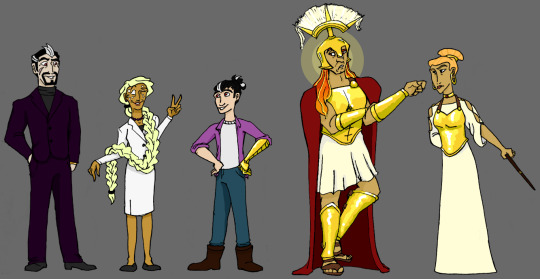
Here are some of the OCs from my fanfiction "The Other Side of the Drachma".
In order from left to right, we have: Saturn, Ananke, Pike, Hyperion, and Circe!
Saturn - This is Cronus' new chosen name. The heroes defeated him in this AU by making him a friend, no longer their foe. Now, he is Jay's main mentor, and the god that runs Elysium under Hades' watchful eye.
Ananke - She's the wily Mother of the Fates, Necessity Herself! She and Saturn reconnected after he was out on parole. One thing led to another, and they're now happily married.
Pike - Also known as the young King Picus from Ancient Roman lore, he's an Etruscan demi-god and son of Saturn. When he refused Circe's romantic advances back in the day, she turned him to stone. The heroes in this AU were able to revive him, but he'd already lost his arm. Now, he is a love interest for this AU's Herry.
Hyperion - With Cronus defeated, the heroes still have a major threat to face: Hyperion, the OG Sun God! He's the eldest son of Uranus & Gaia, has a terribly short temper, and he's constantly on the warpath to reclaim the throne of the gods. (He's just not very good at it.)
Circe - She's that Circe, from the Odyssey. Granddaughter of Hyperion, she is a powerful sorceress and commander of Hyperion's forces. She holds a soft spot in her icy heart for Pike, as well as Odie, who reminds her of Odysseus.
#cott#cott alternate cronus#cott oc#class of the titans#classofthetitans#cott cronus#cott circe#cott oc circe#cott oc hyperion#cott oc ananke#cott oc pike#cott oc picus#cott oc saturn
16 notes
·
View notes